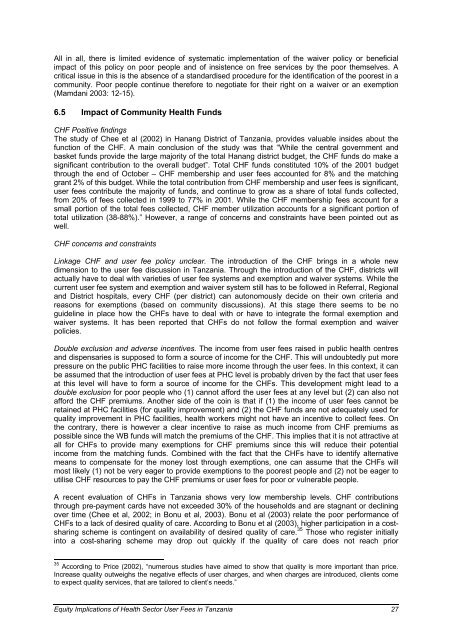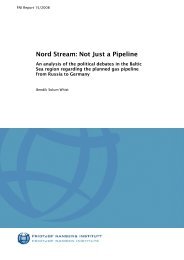equity implications of health sector user fees in tanzania
equity implications of health sector user fees in tanzania
equity implications of health sector user fees in tanzania
You also want an ePaper? Increase the reach of your titles
YUMPU automatically turns print PDFs into web optimized ePapers that Google loves.
All <strong>in</strong> all, there is limited evidence <strong>of</strong> systematic implementation <strong>of</strong> the waiver policy or beneficial<br />
impact <strong>of</strong> this policy on poor people and <strong>of</strong> <strong>in</strong>sistence on free services by the poor themselves. A<br />
critical issue <strong>in</strong> this is the absence <strong>of</strong> a standardised procedure for the identification <strong>of</strong> the poorest <strong>in</strong> a<br />
community. Poor people cont<strong>in</strong>ue therefore to negotiate for their right on a waiver or an exemption<br />
(Mamdani 2003: 12-15).<br />
6.5 Impact <strong>of</strong> Community Health Funds<br />
CHF Positive f<strong>in</strong>d<strong>in</strong>gs<br />
The study <strong>of</strong> Chee et al (2002) <strong>in</strong> Hanang District <strong>of</strong> Tanzania, provides valuable <strong>in</strong>sides about the<br />
function <strong>of</strong> the CHF. A ma<strong>in</strong> conclusion <strong>of</strong> the study was that “While the central government and<br />
basket funds provide the large majority <strong>of</strong> the total Hanang district budget, the CHF funds do make a<br />
significant contribution to the overall budget”. Total CHF funds constituted 10% <strong>of</strong> the 2001 budget<br />
through the end <strong>of</strong> October – CHF membership and <strong>user</strong> <strong>fees</strong> accounted for 8% and the match<strong>in</strong>g<br />
grant 2% <strong>of</strong> this budget. While the total contribution from CHF membership and <strong>user</strong> <strong>fees</strong> is significant,<br />
<strong>user</strong> <strong>fees</strong> contribute the majority <strong>of</strong> funds, and cont<strong>in</strong>ue to grow as a share <strong>of</strong> total funds collected,<br />
from 20% <strong>of</strong> <strong>fees</strong> collected <strong>in</strong> 1999 to 77% <strong>in</strong> 2001. While the CHF membership <strong>fees</strong> account for a<br />
small portion <strong>of</strong> the total <strong>fees</strong> collected, CHF member utilization accounts for a significant portion <strong>of</strong><br />
total utilization (38-88%).” However, a range <strong>of</strong> concerns and constra<strong>in</strong>ts have been po<strong>in</strong>ted out as<br />
well.<br />
CHF concerns and constra<strong>in</strong>ts<br />
L<strong>in</strong>kage CHF and <strong>user</strong> fee policy unclear. The <strong>in</strong>troduction <strong>of</strong> the CHF br<strong>in</strong>gs <strong>in</strong> a whole new<br />
dimension to the <strong>user</strong> fee discussion <strong>in</strong> Tanzania. Through the <strong>in</strong>troduction <strong>of</strong> the CHF, districts will<br />
actually have to deal with varieties <strong>of</strong> <strong>user</strong> fee systems and exemption and waiver systems. While the<br />
current <strong>user</strong> fee system and exemption and waiver system still has to be followed <strong>in</strong> Referral, Regional<br />
and District hospitals, every CHF (per district) can autonomously decide on their own criteria and<br />
reasons for exemptions (based on community discussions). At this stage there seems to be no<br />
guidel<strong>in</strong>e <strong>in</strong> place how the CHFs have to deal with or have to <strong>in</strong>tegrate the formal exemption and<br />
waiver systems. It has been reported that CHFs do not follow the formal exemption and waiver<br />
policies.<br />
Double exclusion and adverse <strong>in</strong>centives. The <strong>in</strong>come from <strong>user</strong> <strong>fees</strong> raised <strong>in</strong> public <strong>health</strong> centres<br />
and dispensaries is supposed to form a source <strong>of</strong> <strong>in</strong>come for the CHF. This will undoubtedly put more<br />
pressure on the public PHC facilities to raise more <strong>in</strong>come through the <strong>user</strong> <strong>fees</strong>. In this context, it can<br />
be assumed that the <strong>in</strong>troduction <strong>of</strong> <strong>user</strong> <strong>fees</strong> at PHC level is probably driven by the fact that <strong>user</strong> <strong>fees</strong><br />
at this level will have to form a source <strong>of</strong> <strong>in</strong>come for the CHFs. This development might lead to a<br />
double exclusion for poor people who (1) cannot afford the <strong>user</strong> <strong>fees</strong> at any level but (2) can also not<br />
afford the CHF premiums. Another side <strong>of</strong> the co<strong>in</strong> is that if (1) the <strong>in</strong>come <strong>of</strong> <strong>user</strong> <strong>fees</strong> cannot be<br />
reta<strong>in</strong>ed at PHC facilities (for quality improvement) and (2) the CHF funds are not adequately used for<br />
quality improvement <strong>in</strong> PHC facilities, <strong>health</strong> workers might not have an <strong>in</strong>centive to collect <strong>fees</strong>. On<br />
the contrary, there is however a clear <strong>in</strong>centive to raise as much <strong>in</strong>come from CHF premiums as<br />
possible s<strong>in</strong>ce the WB funds will match the premiums <strong>of</strong> the CHF. This implies that it is not attractive at<br />
all for CHFs to provide many exemptions for CHF premiums s<strong>in</strong>ce this will reduce their potential<br />
<strong>in</strong>come from the match<strong>in</strong>g funds. Comb<strong>in</strong>ed with the fact that the CHFs have to identify alternative<br />
means to compensate for the money lost through exemptions, one can assume that the CHFs will<br />
most likely (1) not be very eager to provide exemptions to the poorest people and (2) not be eager to<br />
utilise CHF resources to pay the CHF premiums or <strong>user</strong> <strong>fees</strong> for poor or vulnerable people.<br />
A recent evaluation <strong>of</strong> CHFs <strong>in</strong> Tanzania shows very low membership levels. CHF contributions<br />
through pre-payment cards have not exceeded 30% <strong>of</strong> the households and are stagnant or decl<strong>in</strong><strong>in</strong>g<br />
over time (Chee et al, 2002; <strong>in</strong> Bonu et al, 2003). Bonu et al (2003) relate the poor performance <strong>of</strong><br />
CHFs to a lack <strong>of</strong> desired quality <strong>of</strong> care. Accord<strong>in</strong>g to Bonu et al (2003), higher participation <strong>in</strong> a costshar<strong>in</strong>g<br />
scheme is cont<strong>in</strong>gent on availability <strong>of</strong> desired quality <strong>of</strong> care. 35 Those who register <strong>in</strong>itially<br />
<strong>in</strong>to a cost-shar<strong>in</strong>g scheme may drop out quickly if the quality <strong>of</strong> care does not reach prior<br />
35 Accord<strong>in</strong>g to Price (2002), “numerous studies have aimed to show that quality is more important than price.<br />
Increase quality outweighs the negative effects <strong>of</strong> <strong>user</strong> charges, and when charges are <strong>in</strong>troduced, clients come<br />
to expect quality services, that are tailored to client’s needs.”<br />
Equity Implications <strong>of</strong> Health Sector User Fees <strong>in</strong> Tanzania 27













